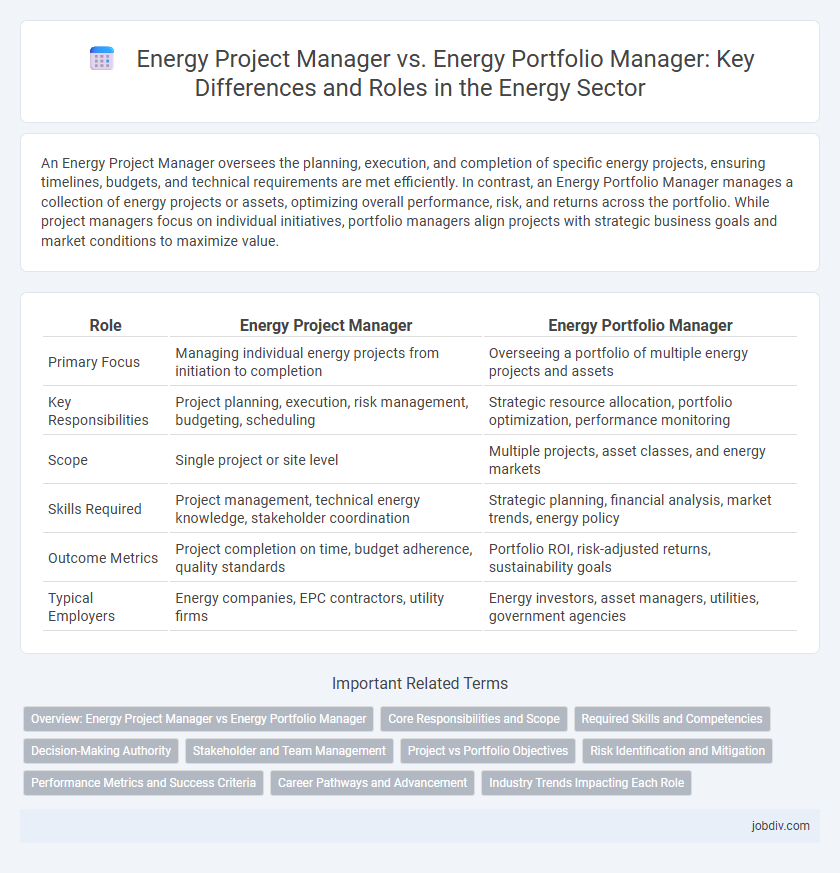An Energy Project Manager oversees the planning, execution, and completion of specific energy projects, ensuring timelines, budgets, and technical requirements are met efficiently. In contrast, an Energy Portfolio Manager manages a collection of energy projects or assets, optimizing overall performance, risk, and returns across the portfolio. While project managers focus on individual initiatives, portfolio managers align projects with strategic business goals and market conditions to maximize value.
Table of Comparison
| Role | Energy Project Manager | Energy Portfolio Manager |
|---|---|---|
| Primary Focus | Managing individual energy projects from initiation to completion | Overseeing a portfolio of multiple energy projects and assets |
| Key Responsibilities | Project planning, execution, risk management, budgeting, scheduling | Strategic resource allocation, portfolio optimization, performance monitoring |
| Scope | Single project or site level | Multiple projects, asset classes, and energy markets |
| Skills Required | Project management, technical energy knowledge, stakeholder coordination | Strategic planning, financial analysis, market trends, energy policy |
| Outcome Metrics | Project completion on time, budget adherence, quality standards | Portfolio ROI, risk-adjusted returns, sustainability goals |
| Typical Employers | Energy companies, EPC contractors, utility firms | Energy investors, asset managers, utilities, government agencies |
Overview: Energy Project Manager vs Energy Portfolio Manager
Energy Project Managers specialize in overseeing individual energy initiatives, ensuring timely delivery, budget control, and coordination of technical teams. Energy Portfolio Managers focus on managing a collection of energy projects, optimizing resource allocation, risk management, and aligning the portfolio with strategic energy goals. Both roles require expertise in energy markets, project lifecycle, and regulatory compliance but differ in scope, with Project Managers concentrating on execution and Portfolio Managers on strategic oversight.
Core Responsibilities and Scope
Energy Project Managers oversee the planning, execution, and completion of specific energy initiatives, ensuring projects meet technical specifications, budgets, and deadlines. Energy Portfolio Managers strategize and optimize multiple energy investments or projects, balancing risk, return, and resource allocation across the portfolio to achieve long-term organizational goals. The Project Manager's scope is task-specific and operational, while the Portfolio Manager focuses on strategic alignment and financial performance across a collection of energy assets.
Required Skills and Competencies
Energy Project Managers require strong skills in project planning, risk management, and resource allocation to ensure successful execution of individual energy initiatives. Energy Portfolio Managers must possess competencies in strategic analysis, financial modeling, and stakeholder engagement to optimize a diverse collection of energy assets and investments. Both roles demand expertise in energy markets and regulatory frameworks, but Project Managers focus on operational execution while Portfolio Managers emphasize long-term value creation and risk diversification.
Decision-Making Authority
Energy Project Managers make tactical decisions focused on individual project execution, managing timelines, budgets, and resource allocation within set parameters. Energy Portfolio Managers hold strategic decision-making authority over multiple projects, optimizing investment portfolios to balance risk, maximize returns, and align with organizational energy goals. The distinction lies in the scope, with Portfolio Managers driving high-level decisions impacting overall energy asset performance and sustainability strategies.
Stakeholder and Team Management
Energy Project Managers direct specific energy initiatives, coordinating multidisciplinary teams to meet defined goals and timelines while managing stakeholder expectations through regular updates and risk mitigation. Energy Portfolio Managers oversee a collection of energy projects, aligning them with strategic business objectives by balancing resource allocation, prioritizing investments, and engaging stakeholders at multiple organizational levels for integrated decision-making. Both roles require advanced communication skills and leadership to navigate complex stakeholder landscapes and ensure cohesive team performance across varied energy assets.
Project vs Portfolio Objectives
An Energy Project Manager oversees the execution of individual energy initiatives, ensuring specific project objectives such as budget compliance, timeline adherence, and technical specifications are met. In contrast, an Energy Portfolio Manager prioritizes and coordinates multiple projects to align with broader organizational goals, optimizing resource allocation and balancing risk across the entire energy portfolio. Project management focuses on delivering discrete energy projects successfully, while portfolio management targets strategic value creation and long-term performance of the energy assets.
Risk Identification and Mitigation
An Energy Project Manager focuses on identifying and mitigating risks associated with individual energy projects, such as schedule delays, budget overruns, and technical challenges. An Energy Portfolio Manager oversees risks across multiple projects, emphasizing portfolio diversification, market fluctuations, regulatory changes, and resource allocation to optimize overall investment returns. Effective risk identification and mitigation in energy management involve integrated strategies that align project execution with broader portfolio performance goals.
Performance Metrics and Success Criteria
Energy Project Managers focus on specific project performance metrics such as timeline adherence, budget control, and resource allocation efficiency to ensure successful project delivery. Energy Portfolio Managers prioritize aggregated success criteria including overall portfolio return on investment (ROI), risk diversification, and alignment with strategic energy goals to optimize long-term value. Both roles require data-driven monitoring, but Project Managers emphasize tactical execution while Portfolio Managers concentrate on strategic performance optimization across multiple projects.
Career Pathways and Advancement
Energy Project Managers specialize in overseeing individual energy projects, focusing on planning, execution, and resource allocation to ensure timely and budget-compliant delivery. Energy Portfolio Managers manage multiple energy projects or investments, optimizing resource distribution and strategy alignment to maximize overall portfolio performance. Career advancement for Project Managers typically leads to senior project leadership roles, while Portfolio Managers often progress toward executive positions such as Director of Energy Investments or Chief Energy Officer.
Industry Trends Impacting Each Role
Energy Project Managers are increasingly adopting digital tools and agile methodologies to manage complex renewable energy projects, driven by the surge in decentralized energy systems and regulatory shifts favoring sustainability. Energy Portfolio Managers focus on optimizing asset allocation and risk management amid volatile energy markets, integrating advanced analytics and ESG criteria to align with evolving investor demands and policy frameworks. Both roles are deeply influenced by the accelerating transition to clean energy and the growing importance of data-driven decision-making in the industry.
Energy Project Manager vs Energy Portfolio Manager Infographic

 jobdiv.com
jobdiv.com